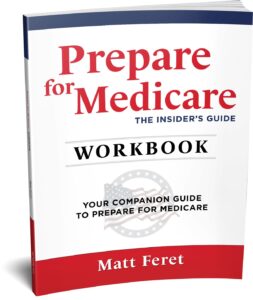Dear Matt,
Can I use drug discount programs like GoodRx with my Medicare Part D prescription drug benefits?
Thanks,
Janice B.
Drug Discount Coupon Programs and How they Work
GoodRx is just one of many drug discount coupon programs out there advertising savings on prescription drugs. There are several companies out there spending enormous amounts of advertising money, touting their programs as a way help people save at the pharmacy counter. You mentioned one of them, GoodRx, but WeRx, Blink Health, and Optum Perks are just a few examples of others.
These companies have slick apps you can load onto your phones and even access “premium” discount services for a monthly subscription fee, like GoodRx Gold.
These prescription discount cards and apps often look, walk, talk and smell like “real” insurance. They’re not. That’s all these prescription drug discount plans are: discount cards. They’re not honest-to-gosh insurance. These are merely discount cards that incentivized people to bypass their real insurance benefits. Unfortunately, I’ve run into quite a number of Medicare insurance agents who actually recommend their clients use these discount cards. I’ve even heard people say their pharmacists try to use these discount cards instead of the Medicare Part D benefits at the counter. I think that’s a disservice, and I’ll explain why below.
How Do Prescription Discount Cards Like GoodRx Work?
Drug discount programs like GoodRx help people save money at the pharmacy counter by negotiating deals with Pharmacy Benefit Management companies (PBMs), who, in turn, have negotiated drug discounts and rebates with drug manufacturers. They inject themselves in the “middlemen” category in-between the PBMs and the consumer.
Pharmacy Benefit Managers are companies that normally function as “middlemen” between drug manufacturers and insurance companies. GoodRx and other discount prescription drug companies act as “middlemen to the middlemen” and pass on those PBM discounts to the consumer instead of the insurance companies.
GoodRx then passes those rebates they get from the PBMs to the consumer and gets paid a fee (or commission) from the PBM. That’s how they make the bulk of their money.
Medicare and Prescription Drug Discount Cards
Look, anything that enables people to spend less on prescriptions is a good thing. Unfortunately, you cannot use a discount program and Medicare insurance simultaneously. The discount programs don’t work with Medicare Part D Prescription Drug Plans or Part D plans embedded within a Medicare Advantage plan (MAPD). By “don’t work, ” they don’t coordinate with insurance companies. Again, prescription discount cards are not “real” insurance. “Real” insurance can coordinate discounts and annual spending, track claims and health conditions, identify potentially harmful prescription drug interactions, and a thousand more items.
I found a GoodRx Investor’s Day presentation reporting that 34% of all of their customers are people on Medicare. This concerns me. That means millions of people on Medicare are getting prescription drugs with a coupon, and their Medicare insurance company likely doesn’t know about it.
Using a discount card at the pharmacy counter instead of your insurance benefits is the same thing as using a coupon at the grocery store. You’re getting a discount off the retail price, but there’s no insurance claim being processed. The Medicare insurance company won’t know you got a prescription from the pharmacy, where the real problem lies.
Does GoodRx Work With Medicare?
No. Using a Prescription Discount Card instead of your Medicare Part D benefits—either through a Medicare Part D Prescription Drug Plan or a Medicare Advantage plan—means the prescription costs won’t count towards the four phases of Medicare Part D. In other words, they won’t count against your annual spend and thus, won’t move you through the four phases of Medicare Part D.
If you use a discount card, the Medicare Part D insurance company can’t track your prescription drug costs and spending through the four phases because they don’t know you’re purchasing prescriptions using a discount card.
Essentially, suppose you’re using a discount program and not your Part D Medicare benefits. You’re paying cash (with the discount) for that prescription, and the Medicare insurance company doesn’t know you’re filling a prescription. This is potentially problematic because the Medicare insurance company can’t track your prescription drug spending or potentially harmful drug interactions.
Whatever prescription you buy with a discount card won’t apply to your Medicare deductibles and coinsurance. Once you use your Part D benefits, none of the medications purchased with the discount card or program will have applied to your Medicare Part D coverage. When you eventually do use your Medicare Part D benefits for a prescription, you won’t have received any financial “credit” for the prescriptions you purchased through the discount program. Thus, I’d recommend not using a discount card to pay for your medications if you’re on Medicare.
Janice, I hope that helped you!
I love answering Medicare questions. Send me yours by clicking here and I’ll pick a few for a future blog post!
To your wealth, wisdom, and wellness!
-Matt Feret
Related Articles
2022 Five Star Medicare Plans Announced – What Does This Mean and Why Should I Care?
The 2022 Medicare Advantage Open Enrollment Period Is Here!
Subscribe Today to My Prepare for Medicare Newsletter and Stay Up-to-Date on Medicare Changes!
The Prepare for Medicare newsletter is an exclusive subscription-only newsletter that delivers the inside scoop to help you stay updated with your Medicare insurance coverage, highlight Medicare news you can use, and provide reminders for important dates throughout the year. Subscribe today for FREE!
Author Bio Matt Feret is the author of the Prepare for Medicare book series and launched prepareformedicare.com to help people get objective answers to questions about Medicare. Matt is also the host of The Matt Feret Show. He has held leadership roles at numerous Fortune 500 Medicare health insurers in sales, marketing, operations, product development, and strategy for over two decades.






